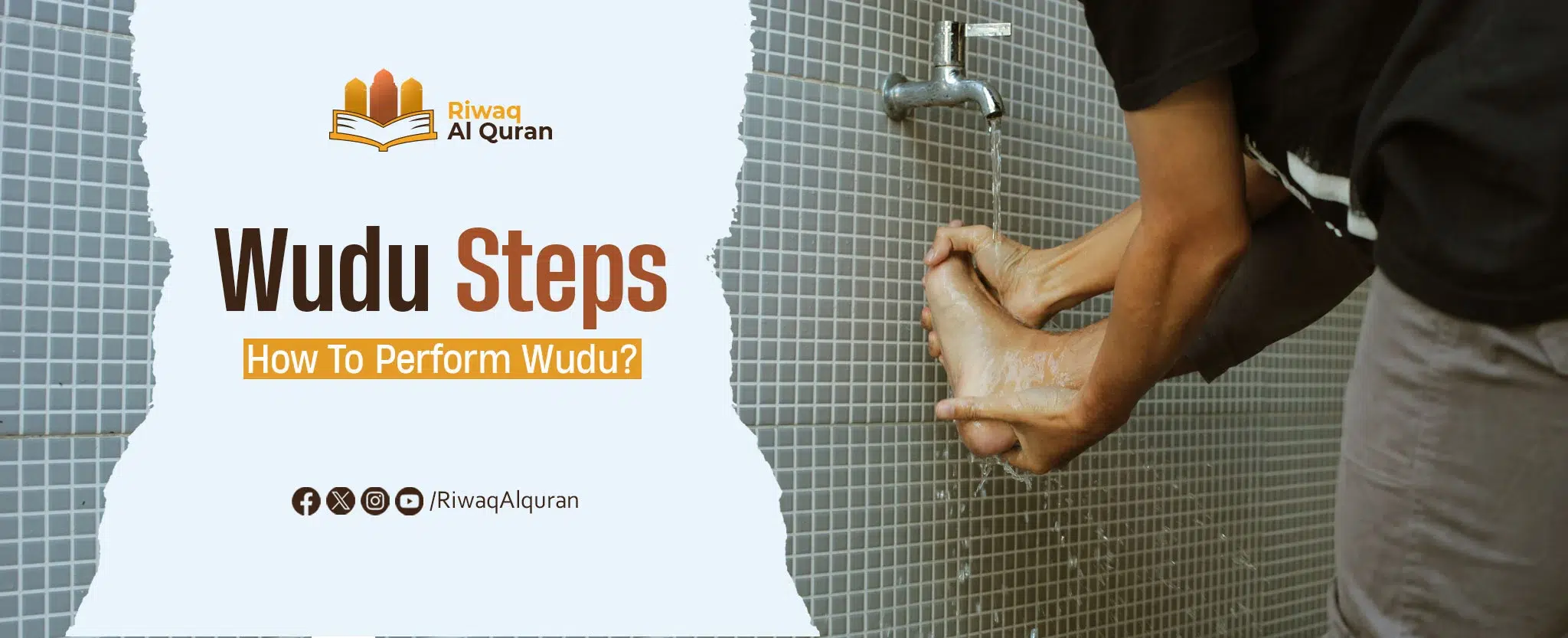Wudu, an essential ritual in Islam, entails washing specific body parts to achieve both physical and spiritual purity. With obligatory steps like intention and washing the face, and recommended practices such as saying Bismillah, wudu prepares believers for prayer.
Wudu importance lies in its role as a prerequisite for Salah, symbolizing spiritual readiness and devotion. Temporary tattoos that don’t obstruct water are permissible, contrasting with permanent ones, which are forbidden.
Cleaning plays a central part in Islam – that’s why it’s always the first thing detailed in the books of Fiqh. Today we will discover the basics of cleaning and performing (Wudu).
Table of Contents
What’s Wudu?
Wudu, also known as ablution, is an act of worship in Islam, involving the meticulous washing of specific body parts in a prescribed manner to attain a state of purity (Taharah).
Wudu not only purifies the body from physical impurities but also cleanses the soul from sins, serving as both a physical and spiritual purification process. In essence, wudu serves as a dual function: it is both a ritualistic act of worship and a means of spiritual cleansing and purification
Wudu Meaning
Wudu in Arabic has its origin meaning of brightness, showcasing how wudu affects outer appearance and inner purity. Wudu can also be used to refer to the water used for cleaning.
Types of Wudu
The Word (wudu) is used for the simple act of ablution.
But if you don’t have water available, or if you did a major act like intercourse with your spouse, in these cases come the different types of wudu (cleaning).
Taiamum
If water is not found or is rare, we can clean ourselves up with sand. One hit on the sand then wipe the face, and another hit and then wipe the hands.
Taiamum shows the principle of Allah’s mercy: “Allah doesn’t demand from a soul more than it can bear.”
Ghusl
Ghusl simply means a shower; to wash the whole body with water. This is the bigger type of cleaning needed after intercourse with a spouse.
Wudu Steps
Follow along step by step and you will be able to perform wudu easily
Here is how to make ablution steps:
First step: Wash your palms with water:
The first step in wudu involves washing your palms with water. It is important to ensure that water thoroughly covers the palms, reaching between the fingers and covering the entire hand. This ensures that all areas are cleansed properly, removing any impurities or dirt that may be present.
Additionally, allowing water to flow between the fingers helps in ensuring thorough cleanliness and purification. Overall, this step sets the foundation for the subsequent stages of wudu, emphasizing the importance of cleanliness and attention to detail in the ritual.
Second step: Rinse the mouth and inhale water from the nose then expel it.
This may be hard at first if you are not used to inhaling and then expelling water from your nose. Put your nose in the water then simply inhale and exhale. This cleanses your nose from the inside and helps with better breathing.
Third step: wash your face
Collect water in your palms, then wipe over your face. The face is from the top where the hair starts down to the chin, and sideways from ear to ear. wipe over this whole area and if you have a beard you can pass water in it with your fingers.
Wash your face once, twice, or three times.
Fourth step: wash your hands to the elbows
collect some water in your palm then tilt it upwards, having the water slide down over your hand while wiping over it with the other palm. make sure to wash all the area starting from fingers all the way to the elbow.
Wash your hands once, twice, or three times.
Fifth step: wipe your hand over your head once.
The fifth step in wudu involves wiping your hand over your head once. With your hand wet, gently pass it over your head from the front to the back and then return to the front in one fluid motion.
This action ensures that the top of the head is cleansed and purified as part of the ritual. It’s important to perform this step with mindfulness and care, ensuring that the entire head area is covered by the wiping motion.
Sixth step: wipe the ear once
In the sixth step of wudu, wipe your index fingers inside your ears and your thumbs behind your ears, ensuring that both are thoroughly cleaned. It’s essential to perform this step with mindfulness and care, ensuring that each ear is wiped gently and effectively.
Seventh step: wash your feet with your hands
Pass your hands over your feet with water and remove any dirt on it. wash between your toes with your hand to remove any hidden dirt on them. Make sure to wash the whole foot, from toes to ankles.
Wash your feet Once, twice, or three times.
Fard of wudu
The Fard (obligatory) components of wudu are essential actions that must be performed for the ablution to be valid. These components are integral to the purification process and cannot be omitted. Here are the six necessary Fard in Wudu:
Intention (Silent):
The intention to perform ablution should be made silently within oneself. While not explicitly spoken aloud, the intention is crucial as it establishes the purpose behind the ritual purification.
Washing the Face:
This involves thoroughly washing the face, from the hairline to the chin and from ear to ear, ensuring that all areas are covered with water.
Washing Hands to Elbows:
The arms, including the hands and forearms up to the elbows, must be washed, ensuring that water reaches all parts of the limbs.
Wiping Over the Head:
With wet hands, the head should be wiped once, ensuring that the entire head is covered, including the top, back, and sides.
Washing Feet to Ankles:
Both feet, including the ankles, should be washed, making sure that water reaches between the toes and covers the entire surface of the feet and ankles.
Order of Steps as Mentioned:
Following the prescribed order of the ablution steps is essential. Each step should be performed sequentially as outlined: intention, washing the face, washing hands to elbows, wiping over the head, and washing feet to ankles.
These six Fard actions constitute the core elements of wudu and must be performed correctly and in the specified order for the ablution to be valid.
Sunnah of wudu
The Sunnah acts of wudu are recommended actions that, while not obligatory, are highly encouraged as they enhance the spiritual and physical purification process. Here are some Sunnah practices associated with ablution:
Saying Bismillah before Wudu:
Initiating the ablution with the recitation of “Bismillah” (In the name of Allah) signifies starting the ritual with the name of Allah, seeking His blessings and guidance.
Rinsing the Mouth and Inhaling Water:
Gargling water and inhaling it lightly into the nostrils not only cleanses these areas but also serves as a form of internal purification, ensuring thorough cleanliness.
Wiping Over the Ears:
While wiping over the ears is a Fard action, it is also recommended to perform it as part of the Sunnah, ensuring that every part of the head is touched by water during the purification process.
Washing the Hands before Ablution:
Before beginning the formal ablution process, it is recommended to wash the hands thoroughly, removing any impurities or dirt, thus preparing oneself for the ritual of purification.
Washing Two or Three Times (Except the Head):
While washing each body part, it is recommended to wash them two or three times, except for the head, which is wiped once. This repetition ensures thorough cleansing and spiritual purification.
By incorporating these Sunnah practices into the ablution process, one not only fulfills the obligatory aspects of wudu but also enhances the spiritual experience, drawing closer to Allah through mindful and thorough purification.


Wudu steps in The Quran
Wudu steps are mentioned in Surah Al-Ma’idah:
“O believers! When you rise up for prayer, wash your faces and your hands up to the elbows, wipe your heads, and wash your feet to the ankles. And if you are in a state of ˹full˺ impurity, then take a full bath. But if you are ill, on a journey, or have relieved yourselves, or have been intimate with your wives and cannot find water, then purify yourselves with clean earth by wiping your faces and hands. It is not Allah’s Will to burden you, but to purify you and complete His favor upon you, so perhaps you will be grateful.”Surah Ma’idah Ayah 6
This ayah is the main reference in regard to Wudu. Hadith elaborates more on how to make ablution, how many times, what is sunnah in wudu, what to say before and after, and so on.
Why is Wudu Important?
Wudu is indispensable for Salah, akin to a pen for writing—without it, the act lacks substance. It not only ensures physical cleanliness but also washes away sins, preparing the heart for prayer.
Wudu fosters Khushou’ (presence of mind and fear of God), vital for Salah, serving as a reminder of our impending audience with our Creator. Active mindfulness during wudu translates into a more meaningful Salah experience, making it crucial to approach wudu with diligence as it shapes our prayer.
1. Attainment of Adornment on the Day of Judgment:
Performing wudu leads to the attainment of adornment on the Day of Judgment, as stated by Prophet Muhammad (peace be upon him). This adornment is symbolized by the brightness achieved through ablution, which will distinguish believers in the Hereafter.
2. Source of Honor and Distinction:
Wudu is a means of honor and distinction on the Day of Judgment. Those who perform wudu will be recognized by the marks of prostration and cleanliness, highlighting their devotion and piety.
3. Expiation for Sins and Elevation of Status:
Wudu serves as an expiation for sins and elevates one’s status in Paradise. The Prophet emphasized that perfecting wudu leads to the forgiveness of sins and the removal of impurities from the body, ensuring a higher rank in the afterlife.
4. Sign of Faithfulness:
Maintaining wudu is a sign of faithfulness and commitment to one’s religious duties. Those who preserve wudu will be distinguished among believers on the Day of Resurrection, demonstrating their dedication to spiritual purification.
5. Pathway to Paradise:
Performing wudu before sleeping and excelling in its performance are highlighted as acts that lead to Paradise. The Prophet emphasized that those who perfect their wudu and perform it with sincerity will be granted entry into Paradise, reflecting its pivotal role in spiritual elevation.
How Long Does Wudu Last?
The duration of wudu is not determined by a specific timeframe; rather, it remains valid until one of several actions causes it to break. Once wudu is performed, it signifies a state of ritual purity until it is invalidated.
Wudu remains intact unless it is broken by certain actions:
- Passing wind
- Using the bathroom
- Sleeping, or losing consciousness due to fainting, intoxication, etc.
- Actions necessitating a full ritual bath (ghusl)
- Menstruation or postnatal bleeding in women
However, there is some difference of opinion among scholars regarding whether certain actions invalidate wudu:
- Touching one’s genitals
- Physical contact with women
- Consuming camel meat
While the above actions are not universally agreed upon to break wudu, they are areas where differing interpretations exist among scholars.
Can you pray without wudu?
No, You can’t pray without wudu, the Salah is nullified without ablution and you have to repeat it, as it doesn’t count.
As narrated by the Prophet Muhammed peace be upon him: “There is no prayer for the one without wudu” Ibnmajah
Is Istinja Required before Wudu?
No, Istinja is not required before Wudu.
Istinja is cleaning yourself after you finish going to the bathroom. Istinja is only required after going to the restroom. You should clean yourself after you finish, and make sure no Najasa is on your clothes.
It is also not from Sunnah to regularly do Istinja before wudu. That’s usually a sign of (Waswasah), or whispers of the devil and we shouldn’t follow or entertain such thoughts and stick to following Sunnah.
You don’t even need to do Istinja with everything that breaks Wudu, so if you wake up from sleep or have passed wind you don’t need to do Istinja before Wudu.
Can You Do Wudu With Temporary Tattoos?
Yes, if these temporary tattoos are just a color that doesn’t prevent water from reaching the skin. If it’s like a layer over the skin –feels like plastic or waterproof when touched, then you can’t do that as it makes the wudu and even Ghusl invalid.
Temporary tattoos that are like coloring the skin and fade away after some time similar to Henna, are permissible (insha’aAllah).
But note that permanent tattoos are haram and are a major sin, and similarly tattoos that use the same concept of piercing the skin and not coloring it, even if it fades away after a year or more. And Allah knows best.
Are you ready to learn Salah?
After learning Wudu you need to learn Salah. Learning how to pray is Critical for every Muslim. Imagine coming on the day of Judgment and finding your prayers elevating you to unimaginable heights!
Make sure to learn and apply all you learn properly.
If you find something unclear or you have a question ask one of our experienced teachers by registering for Five pillars of Islam course;
Learn Quran, Arabic And Islamic Studies Online With The Best Native Tutors
Riwaq Al Quran is a comprehensive online platform that offers personalized Quran, Arabic and Islamic Studies Online classes for individuals of all ages and backgrounds.
Their experienced instructors use a structured curriculum to cover Tajweed, Tafsir, and Memorization, providing easy and effective access to learning the Quran.
The advanced online classes allow for seamless communication and interaction between students and teachers. Join Riwaq Al Quran for a deeper connection with the Quran.
We offer several courses such as:
- Online courses for kids.
- Online Quran classes for kids and adults.
- Online Arabic courses
- Online Ijazah courses
- Online Islamic Studies courses.


Conclusion:
Wudu, or ablution, is a fundamental act of worship in Islam, involving the meticulous washing of specific body parts in a prescribed manner to achieve a state of physical and spiritual purity. Derived from the Arabic word meaning brightness, wudu not only cleanses the body but also symbolizes inner purity.
The process involves several steps, including washing the face, hands, wiping over the head and ears, and washing the feet. There are also obligatory (Fard) components of wudu, such as intention, washing specific body parts, and following the prescribed order.
Additionally, there are recommended Sunnah practices associated with wudu, including saying Bismillah, rinsing the mouth and nose, and washing certain body parts multiple times.
The duration of wudu remains valid until broken by specific actions, and its importance lies in its role as a prerequisite for Salah (prayer), symbolizing spiritual readiness and devotion.
While Istinja (cleaning oneself after using the bathroom) is not required before wudu, it is essential to maintain cleanliness. Temporary tattoos that do not prevent water from reaching the skin are permissible for wudu, unlike permanent tattoos, which are prohibited.



































